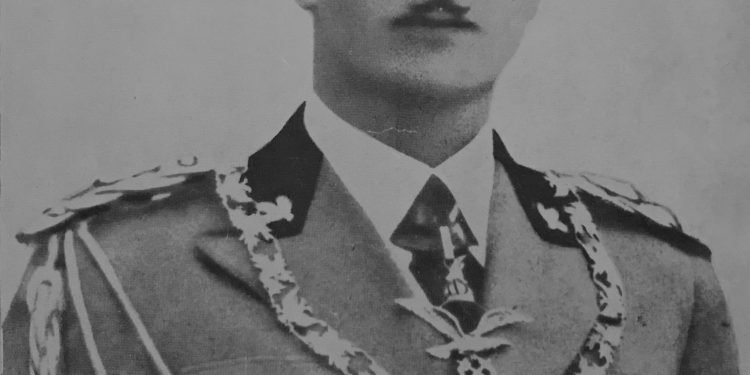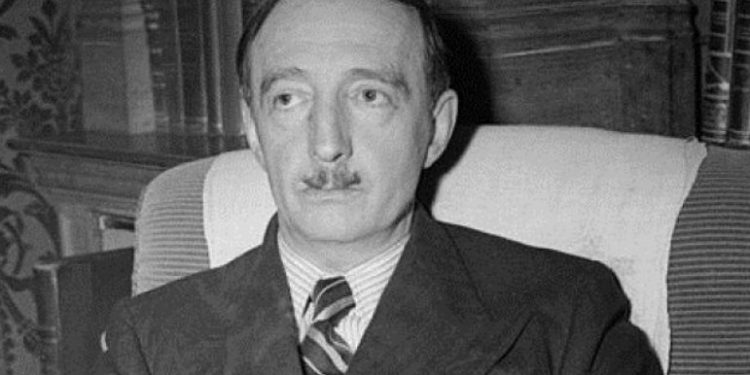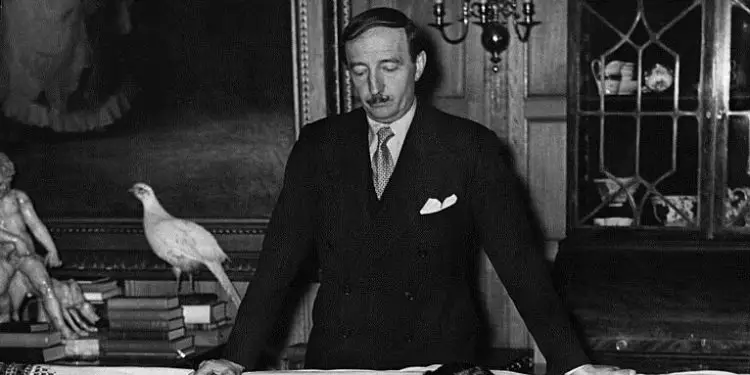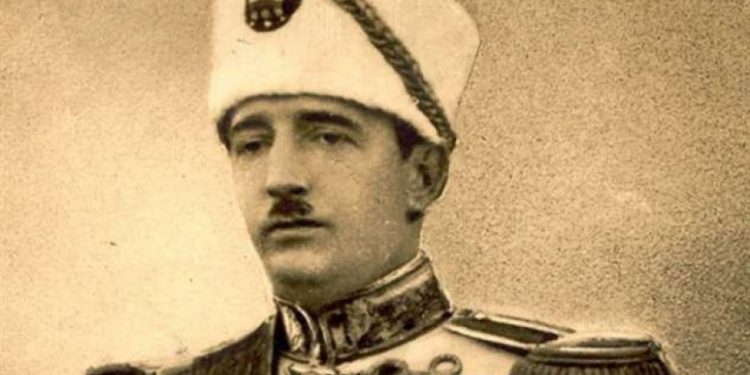Ekrem Spahiu
124th birthday, October 8, 1895-2019
The President of the Republic of Albania, on the occasion of the 100th anniversary of the proclamation of Independence, on November 17, 2012, decorated King Zog I, with the “Order of the National Flag”, with the motivation:
“A major and central figure in the history of Albania, who laid the foundations of the construction and functioning of the modern Albanian state, with a clear Western European orientation. Inventor and implementer of the first administration of the Albanian state, as well as a contemporary legislation of high levels, which would pave the way for social emancipation and development of the country. A personality who connected his whole life with the fates of the nation, of Albania and of the Albanians”.
The formation and activity of Ahmet Zogu
Chronicles of the time tell us that the famous Zogu family, who came from the northernmost part of Albania, settled in Burgajet i Matit at the end of the 15th century. The Zogu family, for generations, was distinguished for extraordinary contributions for the good of Mat and Albania.
Ahmet Zogu, son of Xhemal Pash Zogu and Sadie Emin bej Toptan, was born on October 8, 1895. He received his education and first knowledge from teachers Dërvish Hima, Sali Torra and Hafus Ismeti. At the age of 7, he was sent to Turkey to study, where he graduated from Istanbul High School and the reserve officer’s course. On July 20, 1912, he returned from Turkey to Mat.
He immediately engaged in resisting attacks by Balkan powers. He managed to approach, organize and direct about eight thousand armed men. On November 28, 1912, in the declaration of independence of Albania, he would represent Mat, Dibra and Mirdita, at the head of a representation of 26 prominent leaders of these regions. After the end of the Assembly, he returned to his homeland, where he organized the defense of the provinces of Mat and Dibra from the attacks of the Serbo-Slavic hordes.
World War I found Ahmet Zogu in Mat as a proven commander in battles and victories achieved by his courage and leadership with strategic thinking and clear tactical concepts. On March 3, 1916, on his own initiative and with other patriots, they organized the National Congress in Elbasan, to discuss the fate of Albania.
In 1919, Albania, which had remained from the geopolitical calculations of the Great Powers of 1913, was in real danger of territorial fragmentation in favor of its Shovene neighbors. In these circumstances, under the influence of vocation and high patriotic formation, Ahmet Zogu becomes one of the main protagonists for the convening of the historic Congress of Lushnja, which met on January 21-31, 1920, as a conclusion of an agreement of all regions of Albania. . The success of the work of the Congress was ensured militarily by Ahmet Zogu and after its completion, approved the new Government, in which Ahmet Zogu was appointed Minister of Interior, exactly at the age of 25 years. The Congress of Lushnja realized the independence of the Albanian state and laid the legislative bases for all state institutions. On December 2, 1922, the Supreme Council charged Ahmet Zogu to form a new government, electing him Prime Minister and Minister of Interior. On February 23, 1924, the opposition staged an assassination attempt within the Constituent Assembly and wounded Ahmet Zogu, the country’s Prime Minister, because it disagreed that Zogu, with the support of the coalition with the Independents, secured a new majority.
Ahmet Zogu, although seriously injured, entered the hall where the Assembly meeting would take place without giving any alarm signal. To calm the situation and avoid the risk of an armed conflict, with extreme composure and restraint, he addressed the Speaker of the Session and the deputies: “Gentlemen, it is not the first time in the world that something like this happens in a parliament that happened to me.”I beg my friends to weigh the case calmly and forget for a moment what happened.”
However, the assassination attempt on Prime Minister Ahmet Zogu in the Assembly greatly complicated the political situation in Tirana. In order not to give rise to a further complication of the situation, which would destabilize the security of the country, perhaps irreversibly, on February 25, 1924 Ahmet Zogu resigned from the post of Prime Minister. With the calm he maintained towards the assassination attempt against him, as well as with his resignation, he wanted to give the message that, for him, the stability and security of the country was most important.
Despite Zog’s resignation, the political and order situation worsens and the country begins to destabilize. In May-June 1924 the opposition organized a coup. The “Vrioni” government, which was overthrown on June 10, 1924, in its last days, had appointed Ahmet Zogu as the commander of the coup in the north. In June 1924, in order not to cause bloodshed, total anarchy and civil war, Zogu left Albania. The political court of his political opponents sentenced him to “death in absentia”.
In December 1924, with the decision of the government “Vrioni” and with the support of the Great Powers, Zogu restored the legitimacy of the Government and the legitimate power arising from the parliamentary elections of October-December 1923 and overthrown by unconstitutional rebellion in June 1924. On January 5, 1925, the Government of Iljaz Vrioni resigned and on January 6, 1925, the High Council appointed Ahmet Zogu Prime Minister and Minister of Interior.
In the last seven years after World War I, 14 governments were replaced, mostly in 1920-1924. The High Council, as the main institution in the fate of governments, under the pressure of the politics of the time, also took decisions that did not benefit the stability of the country. To resolve this impasse once and for all, but also for other reasons, on January 21, 1925, the Constitutional Assembly proclaimed the “Republic of Albania”, while ten days later, (January 31, 1925) Ahmet Zogu was elected President of the Republic, being at the same time the head of the executive power.
During this time, Ahmet Zogu’s main priority was to restore stability in the country, enabling the signing of important economic, political and military agreements, which significantly strengthened Albania’s position.
Proclamation King of the Albanians
The need to change the regime in Albania came as a general assessment of the real situation that the country had and was going through, but also as a necessity, to come out above the various political forces and local leaders, as the risk of quarrels, intrigues and individual behind the scenes was seen as a major national problem and to the detriment of the interests of the country.
Considering the above, as well as the very important fact that, exactly in those years, the security situation in the Balkans and in Europe was deteriorating, then for Albania and the Albanians wherever they lived, there was no other solution of salvation, survival and national security, in addition to shifting to an even greater concentration of energies, efforts and forces of the whole nation, which was embodied in the political solution of the installation of the Monarchy. Such an experience of concentrating political power in times of great danger has been experienced by many nations, regardless of the form in which this concentration has been made. This is how Germany once acted under the “Monarch” Bismarck. This is what our closest neighbors, Serbia, Greece, etc., did. Albania had no reason to make an exception to this rule, otherwise it would continue to be the object of wild greed.
The transition from the regime of the Republic to the regime of the Kingdom was, not only necessary, but also lawful. Ahmet Zogu was very careful in his steps to change the form of the regime in Albania, working in several directions and to be in harmony with the Albanian political process, public opinion, conviction and support received from the international community and in particular by the Great Powers, and above all by initiatives and observance of constitutional and legal procedures.
Following a proposal made by several deputies, parliament decided to consider the state regime. After the early elections on August 25, 1928, a change of form of government was proposed, the statute commission was formed, which proposed a change of form of regime from republic to monarchy. This proposal was put to a vote on August 30, 1928 and the Constituent Assembly proclaimed Albania a “Hereditary Democratic Parliamentary Kingdom”. On September 1, 1928, the Constitutional Assembly proclaimed President Ahmet Zogu “King of the Albanians”.
King Zog I, immediately began work on the complete reform of the legal framework, institutions and all life of the country. In this context, the Basic Statute of 1928 was adopted. Order and security, justice system, human rights, property right and religious belief, capable and serious administration, strengthening of money, free movement of Albanians, diplomacy , education, intelligence training in western universities, world construction, trade development, etc., were fundamental and found application in Zogist philosophy during this period.
Fascist invasion and removal of King Zog
Fascist Italy had long been preparing for the invasion of Albania, either “peacefully” through political, economic, military and financial pressures, or even by force of arms. After repeated attempts and the ultimate ultimatum to force King Zog, the Albanian parliament and government to submit, the Italian government decided to use force of arms to invade Albania.
Faced with the most difficult test of the time, Zogu conceived of resilience. At best, a serious resistance was anticipated, hoping for international support as well. In the absence of this support, the Albanian resistance would certainly be symbolic. To this end, sensitizing what Italy was preparing against Albania, he called on the forces of the Balkan Entente, the Great Powers of Europe and the USA to intervene in Rome, to stop the attack of Italy, or to give the necessary support to face the danger. That was threatening Albania. Meanwhile, he had begun to organize military resistance, building a clear concept of strategic defense: resistance as much as possible on the coastline in order to exhaust the invading forces and then, confronting them with guerrilla warfare, relying on the ground mountainous of the country, in the Albanian patriotism as well as in the possible support from outside. For this purpose, ready forces would be deployed to develop resistance near the main port cities of the country, where the main directions of the Italian forces’ offensive were, while most of the forces would be concentrated in the depths of the country.
The Kingdom also fostered popular resistance, manifestations, rallies, etc., in order to create a comprehensive national resistance background and to create a more harmonized environment of national awareness against the Italian occupation. But, unfortunately, some high-ranking state officials and many elements of the administration and the army, worked in the opposite direction, and there were even some compromised people who had planned to oppose Ahmet Zogu until his physical annihilation.
Not accepting Mussolini’s terms and ultimatums, having no international support or internal strength to face the fascist aggression, the Albanian Parliament and King Zog decide to welcome fascist Italy with arms in hand, unlike Austria, which had submitted to Germany in 1933 without any objection or Czechoslovakia that had not fired any rifles on March 15, 1939 when it was also invaded by Germany. It should be noted that these two states were much larger than our country and armed with the most modern weapons of the time.
History speaks of an indisputable truth: the fact that Italy, while planning and launching a military operation for the occupation of Albania, forces, means, expenses, logistics and time, shows that the occupier, at least, calculated the Albanian resistance. This resistance was made by the Albanians and King Zog convincingly sided with the Anti-Fascist Allies and against the Nazi-Fascist Axis.
The occupation of Albania by Fascist Italy, on April 7, 1939 marks the beginning of World War II. After all, the Italian occupation of Albania was not merely an undertaking between Italy and Albania, but part of a broader strategy linked to the strategic initiative taken by fascism and Nazism to establish other geopolitical relations in Europe and beyond. Using military force as an instrument, namely war.
King Zog could not do more than he did. He declared before the National Assembly that; “… I have not left the vehicle unused for the security of Albania” and with the decision of the Parliament, on April 9, 1939 he left the country to avoid his unconditional surrender.
Royal Family in Emigration
During the forced displacement from the homeland, on April 10, 1939 Ahmet Zogu settled in Greece where he followed the resistance and organized the functioning of the government; on May 3, 1939 he arrives in Turkey, where he is received by the highest authorities of the country and by the Albanians; on June 30, 1939 he left for Europe; on July 2, 1939 arrives in Romania, where he is received by King Carol of Romania; on 15 August 1939 he arrives in Paris, where he is accommodated in the Temporary Royal Residence and begins official contacts with the highest authorities of France; on 22 June 1941 arrives in the United Kingdom, where he remained until the end of the war; on 18 March 1946 settles in Egypt, following a benevolent invitation of stay and accommodation officially guaranteed by King Farouk of Egypt; on August 29, 1955 arrives in France.
Towards the end of his life, King Zog suffered from an incurable disease and on April 9, 1961, he died at the Foch Hospital in Paris. Tributes were paid on April 10, 1961, and on April 11, 1961, a funeral procession was held with a magnificent procession. His Majesty Zog I – King of the Albanians, was buried in the cemetery of “Thiais Parisien”.
In recognition and appreciation of his personality, contributions and historical and national heritage, on November 17, 2012, on the occasion of the 100th anniversary of the declaration of independence, the Albanian state organized a grand official ceremony to return the remains of King Zog to the Homeland, which were placed in the Mausoleum of the Royal Family in Tirana.
Former MP & Chairman of PLL
Memorie.al















